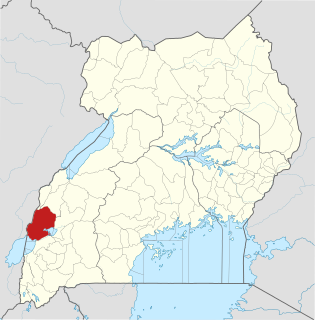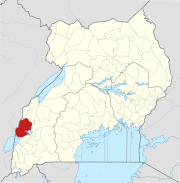TrønderEnergi is a power company based in the municipality Trondheim, Norway that operates hydroelectric power plants and wind farms, as well as the power grid in parts of the county Sør-Trøndelag. The grid encompasses eleven municipalities, and current grid to 120.000 customers. Total electricity production is 3.0 TWh.
Kabalega Hydroelectric Power Station, also known as Kabalega Power Station is a 9 MW (12,000 hp) mini hydroelectric power project located across River Wambabya, in Buseruka Sub County, Hoima District, in Western Uganda. At the beginning of planning and during construction, the power station was referred to as Buseruka Power Station, but was renamed after completion.

The Karuma Hydroelectric Power Station is a 600 MW hydroelectric power project under construction in Uganda. When completed, it will be the largest power-generating installation in the country.
Waki Power Station is a proposed 5 megawatts (6,700 hp) mini hydroelectric power station in Uganda, the third-largest economy in the East African Community.

Kikagati Hydroelectric Power Station, also referred to as Kikagati Power Station, is a 16 MW (21,000 hp) hydroelectric power station, under construction in Uganda.

Mubuku I Power Station is a 5 megawatts (6,700 hp) mini-hydroelectric power station in Uganda.

Mubuku III Power Station is a 10 megawatts (13,000 hp) mini-hydroelectric power station in Uganda.

Mubuku is a settlement in Uganda.

Nshyugyezi Hydroelectric Power Station, also Nsongezi Hydroelectric Power Station, is a planned 39 megawatts (52,000 hp) hydroelectric power station in Uganda. The power project is under development, as of September 2017.

Nyamwamba Hydroelectric Power Station, also referred to as Nyamwamba Power Station, is a 14 megawatts (19,000 hp) mini-hydroelectric power station under construction in Uganda.

Rwimi Hydroelectric Power Station, also Rwimi Power Station, is an operational 5.54 megawatts (7,430 hp) hydroelectric power station in the Western Region of Uganda.
Siti I Hydroelectric Power Station, commonly referred to as Siti Power Station, is a 5.0 megawatts (6,700 hp) mini hydropower station in Uganda.
Lubilia Hydroelectric Power Station, also Lubilia Kawembe Power Station, is a 5.4 MW hydroelectric power station in Uganda, the third-largest economy in the East African Community.

Nkusi Hydroelectric Power Station, also referred to as Nkusi Power Station, is a 9.6 MW (12,900 hp) hydroelectric power station under construction in the Western Region of Uganda.
Ndugutu Hydroelectric Power Station, also Ndugutu Power Station, is a proposed 4.8 MW (6,400 hp) mini-hydropower station in the Western Region of Uganda.
Sindila Hydroelectric Power Station, also Sindila Power Station, is a 5.25 MW (7,040 hp) mini-hydropower station under construction in the Western Region of Uganda.

Nyamagasani II Hydroelectric Power Station, also 'Nyamagasani 2 Hydroelectric Power Station, is a 5 megawatts (6,700 hp) mini hydro power station, under construction in the Western Region of Uganda.

Nkenda is a hill in Kasese District in the Western Region of Uganda. The name is also applied to the settlement at the bottom of that hill.







